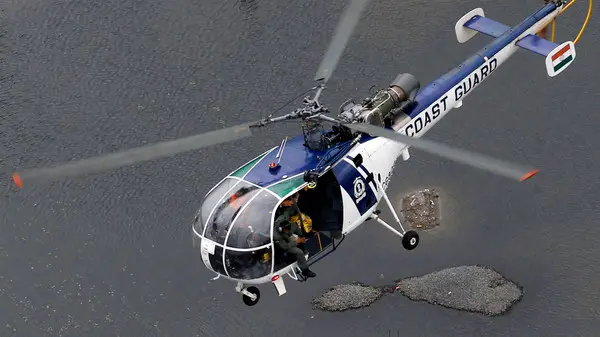AHMEDABAD: On Tuesday, India deployed four ships and two aircraft. They were sent to search for three missing coast guard members. The members went missing after the crash of their helicopter into the Arabian Sea during a rescue operation.
The coast guard helicopter was trying to rescue an injured crew member on an Indian-flagged tanker, about 45 kilometers (27 miles) off the coast of India’s western state of Gujarat late on Monday.
The incident occurred around 11 pm on Monday while the helicopter was conducting a medical evacuation for a seriously injured crew member aboard the Indian-flagged Motor Tanker Hari Leela, in response to a request from the vessel’s Master.
The helicopter took off around 11 pm on Monday. As it approached the vessel, the chopper had to make an emergency landing at sea. The Indian Coast Guard has stated that the cause of this emergency landing is still under investigation.
The crash occurred late on Monday when a four-member team were travelling in a Dhruv Advanced Light Helicopter to collect an injured member of crew on a tanker, off the coast of the city of Porbandar.
“The helicopter had to make an emergency hard landing and ditched into the sea,” the Indian Coast Guard said in a statement.
Officials said the helicopter turned around to make an emergency landing but crashed into the sea before reaching shore.
Search for Missing Crew
The Indian Coast Guard said rescuers saved one crew member, but three remain missing. It said the wreckage of the helicopter has been located and authorities have deployed four ships and two aircraft to search for the missing crew members.
It added that authorities had found the wreckage of the helicopter.
The helicopter crew recently went inland to rescue dozens of people stranded by deadly flash floods in late August. Heavy monsoon rains caused these floods across Gujarat and killed at least 28 people.
The Indian Coast Guard, India’s main maritime security agency, conducts emergency and rescue missions across the country’s vast waters.
This news is sourced from Arab News and is intended for informational purposes only.


![Afghan men search for victims after a Pakistani air strike hit a residential area in the Girdi Kas village, Nangarhar province on February 22, 2026. [Aimal Zahir/AFP/Getty Images]](https://southasiatimes.org/wp-content/uploads/2026/02/gettyimages-2262391441.webp)



